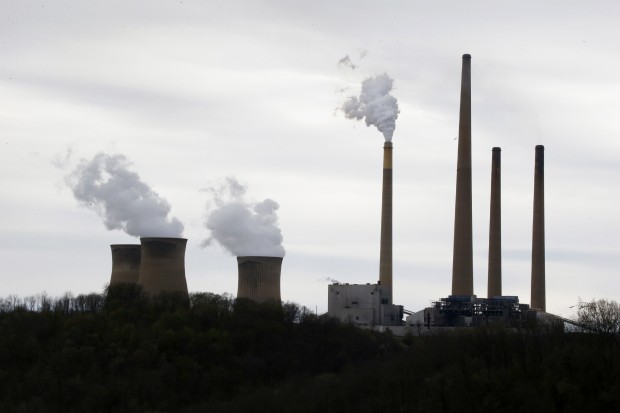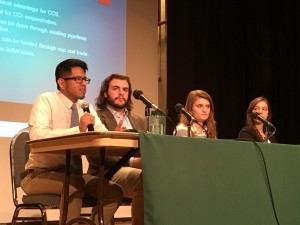Despite legal limbo, Pennsylvania continues work on Clean Power Plan
-
Marie Cusick

Keith Srakocic / AP Photo
Pennsylvania has decided to continue working on the Obama administration's Clean Power Plan, even though it's in legal limbo.
President Obama’s major climate change initiative, the Clean Power Plan, is currently in legal limbo as federal courts decide its fate. But Governor Tom Wolf’s administration has decided to keep working on it anyway.
The goal of the Clean Power Plan is to cut emissions from existing power plants by about a third over the next 15 years. It would mean closing hundreds of coal-fired plants and shifting the grid to more renewable forms of energy. Each state is supposed to come up with its own path to accomplish this.
At a recent legislative hearing Rep. Jeff Pyle (R- Armstrong) lamented the decline of the state’s coal industry and the layoffs workers have faced.
“I come from western Pennsylvania and it’s just breaking our hearts to watch 300 men at a time get shut down, because our coal plants can’t meet the Clean Power Plan,” said Pyle. “I also noted smoke signals coming out of the [Wolf] administration said, ‘We’re gonna go ahead and comply with this, even though the Supreme Court ruled it unconstitutional.’”
Actually, that didn’t happen. The plan has not been declared unconstitutional.
Earlier this year, in a surprise 5-4 decision, the Supreme Court issued a temporary stay. It means the plan can’t move forward until the legal challenges to it are sorted out. John Quigley heads the state Department of Environmental Protection. He says Pennsylvania should keep working on it, even though the future is uncertain.
“One potential outcome of the stay is that if the rule survives intact and the 2018 submission date survives intact we’d have less time to plan if we stopped.”
He says there are about five employees at DEP spending part of their time on it. Whether the plan lives or dies, he says the grid is already undergoing major changes. Cheap natural gas is overtaking coal in electric power generation, and the cost of renewable energy is dropping rapidly.
“It just makes good business sense to continue to plan for what we know is going to happen. This is inevitable,” says Quigley. “It’s smart for Pennsylvania if we’re going to maintain our role as an energy exporter and maintain the role of our energy economy.”
DEP held a series of public meetings on the plan last year; Quigley says more are in the works.
Wolf recently vetoed a budget bill passed by the Republican-led legislature which contained language that would have given lawmakers more oversight in the process. Environmental advocates, like Rob Altenburg of PennFuture, viewed it as a delay tactic that would ultimately have left Pennsylvania with fewer options.
“If a state chooses not to, or is unable to submit a timely plan, then a federal plan will apply,” says Altenburg. “And I know of no state that would prefer a federal plan over a state-specific plan.”
While the political battle in the U.S. continues, the world’s scientists are pretty much all on the same page– climate change is man-made and a serious threat.
“The more we learn, the more we see that action is vital,” says Altenburg. “We really need to address this issue quickly.”

Marie Cusick / StateImpact Pennsylvania
College students discuss solutions to climate change at a Harrisburg forum on the Clean Power Plan.
Altenburg spoke to about 270 college students at a recent forum on the Clean Power Plan in Harrisburg Monday. His message resonated with young people like Elizabeth Plascencia.
She’s graduating from Dickinson College in Carlisle this spring and heading back home to California to work with in science communications.
“[Climate change] is definitely something that’s going to affect everyone, no matter how much money you make or where you live,” she says.
Her generation is inheriting a problem it didn’t create. She says she often talks to older people—including members of her own family—who feel ambivalent and think the climate change will sort itself out.
“It’s important for them to be on board, because they are voters and they are emitters. Everyone has potential to make change,” says Plascencia. “When I have these conversations with some uncles or aunts who are like, “Meh?” I just encourage them to really think about their carbon footprint.”
The sudden and unexpected death of Supreme Court Justice Antonin Scalia now leaves the Clean Power Plan with a court divided evenly between liberals and conservatives.
But whatever the U.S. and Pennsylvania decide to do next climate scientists say that even the historic deal signed by 195 countries in Paris in December 2015 will cut greenhouse gas emissions only by about half of what is needed to avoid an increase in atmospheric temperatures of two degrees Celsius, at which point devastating consequences become unstoppable.
















